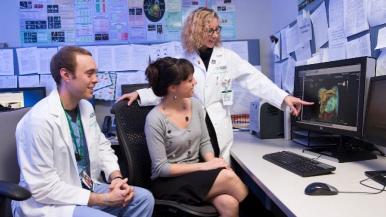This week, Rush University is proud to host its first ever Residency Appreciation Week. To highlight the great work our trainees do across the institution, we’re highlighting each Graduate Medical Education house staff committee. Here’s everything you need to know about RES-CORE from co-presidents Nithin Pusapati, MD (PGY-2, Internal Medicine) and Vishal Jani, DO (PGY-3, Emergency Medicine).
What is the purpose or mission of RES-CORE?
The Resident Committee on the Rush Environment, also known as RES-CORE, is a house staff-led committee that collects and adjudicates instances of mistreatment that occur within the Rush learning environment. We discuss cases during monthly meetings to discuss appropriate approaches to reports we receive. There is also a medical school equivalent of our committee called SCORE – the Student Committee on the Rush Medical College Environment. Rush is deeply committed to maintaining a positive learning environment at all levels of medical education and training.
What encouraged you to get involved in RES-CORE?
Jani: I was looking for a way to get involved outside my residency training program and wanted to find a committee that focused making tangible changes by working with representatives from other programs at an institutional level. RES-CORE was formed during my PGY-1 year, and it appeared to be a good way to achieve this. As I attended meetings, I appreciated the impact RES-CORE's efforts had on those residents/fellows whose cases we addressed.
How many members does RES-CORE have?
We have 25 resident and fellow members.
What initiatives are you working on now?
We continuously monitor an online portal for reports submitted to resolve any on-going issues. The presence of RES-CORE has an impact at the individual level by addressing specific concerns of house staff as well as being part of institutional change.
What is your vision for RES-CORE going forward?
As a committee, we hope to continue to diversify our membership by attracting membership from more programs. Also, we strive to continuously increase awareness among house staff that we are available should they have any concerns that we can address.

